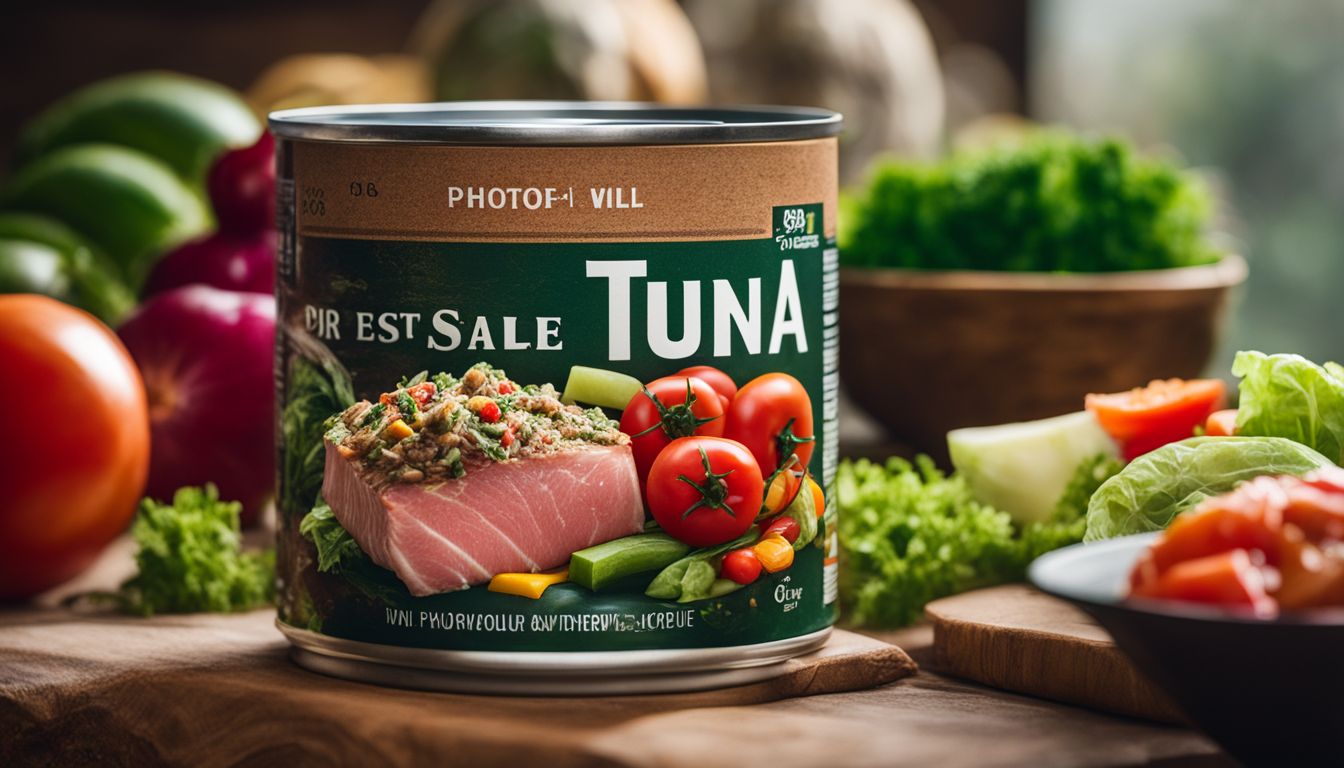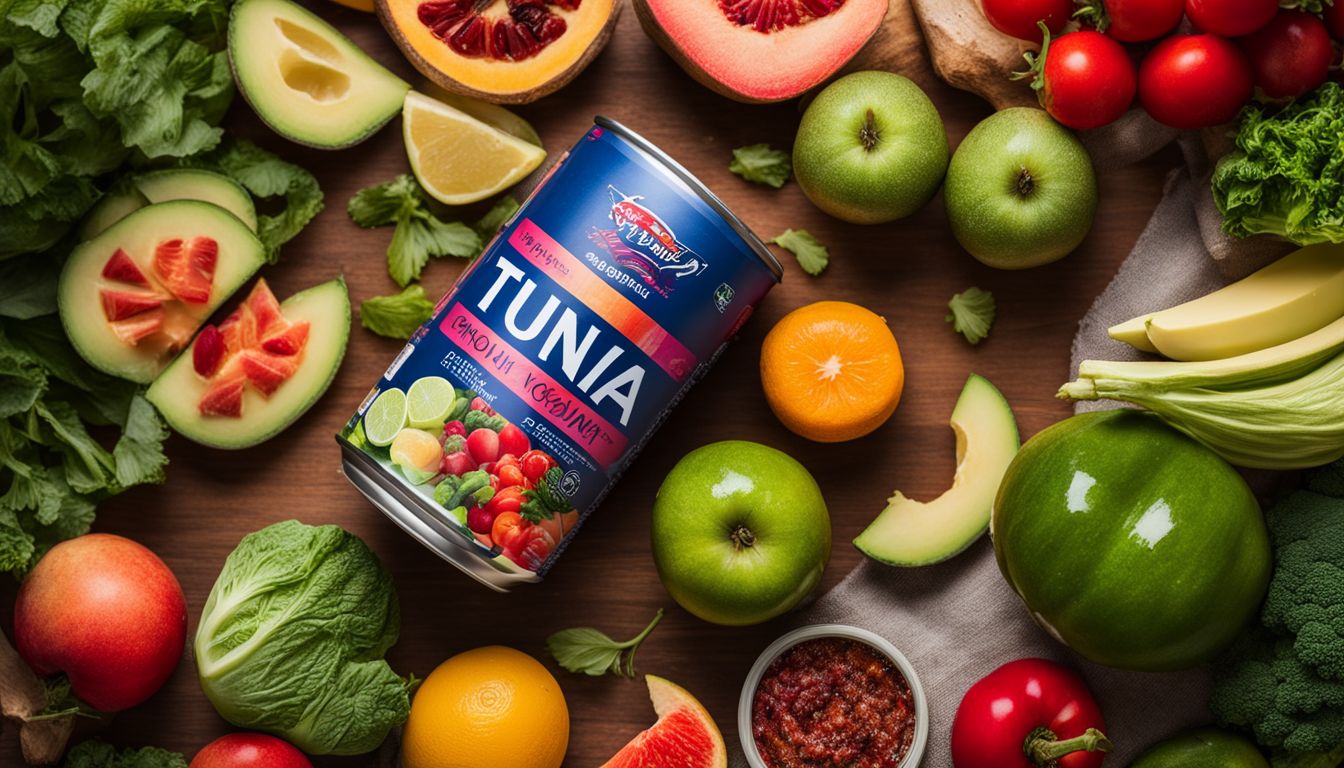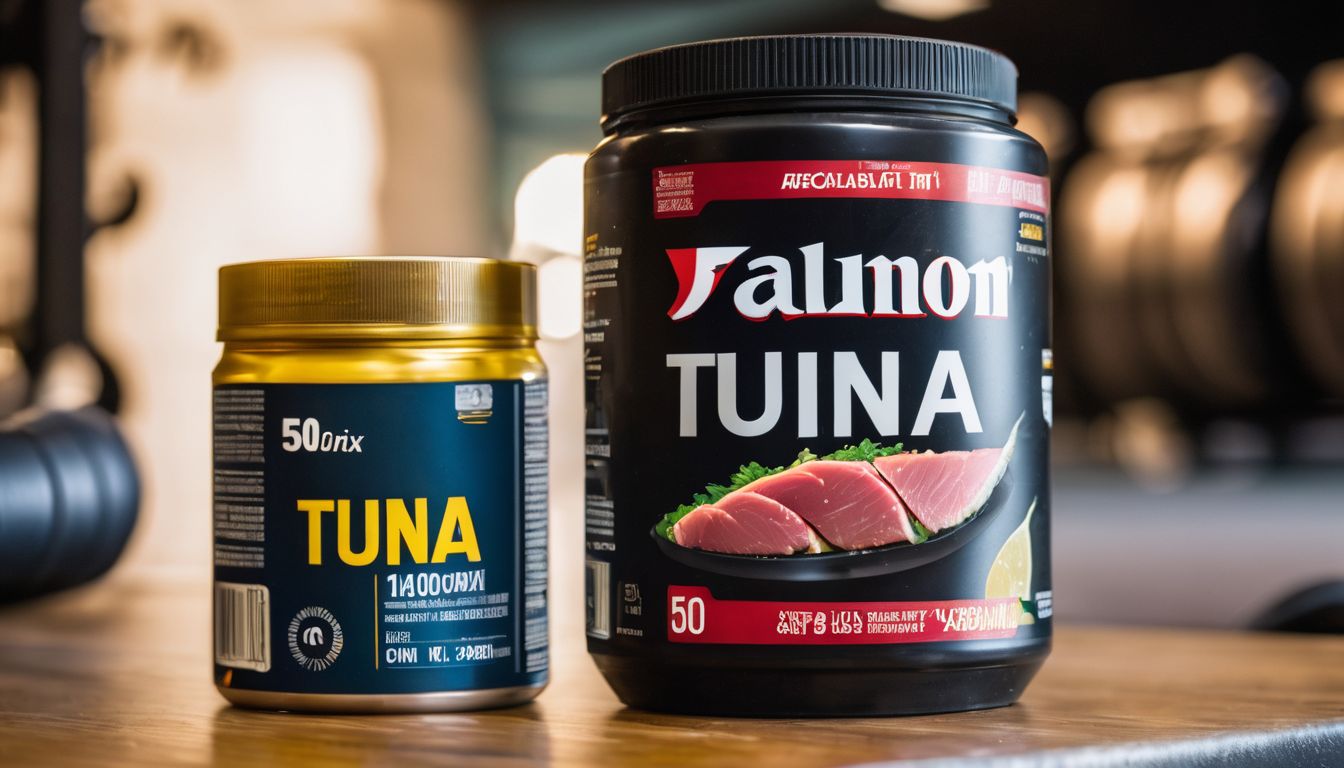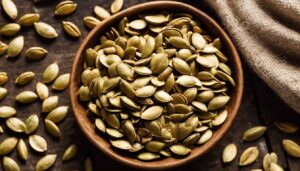Is Canned Tuna A Good Source Of Protein? Exploring The Nutrition, Benefits, And Downsides

Tuna: it’s the go-to protein that fits right inside your kitchen cupboard. As a nutritionist with years of experience in advising on healthy diets, I’ve delved deep into the pantry staples that fuel our bodies.
Canned tuna surfaces as a champion—a lean source of high-quality protein teeming with essential nutrients, all while being wallet-friendly and easy to prepare.
This humble fish comes packed with goodies like vitamin D, omega-3 fatty acids, and selenium—key players for maintaining health from muscle to mind. With its sturdy shelf life and versatility in meals, canned tuna is more than just a convenient option; it’s smart eating made simple.
Ready to learn how this oceanic gem can bolster your diet? Let’s dive in!
Key Takeaways
- Canned tuna is a high – quality protein source, providing about 30 grams of protein per 100 grams of meat, making it an excellent option for muscle growth and repair.
- It contains essential nutrients such as omega – 3 fatty acids, vitamin D, selenium, and vitamin B12 which supports heart health, brain function, vision, bone strength and can help prevent anemia.
- However, potential downsides include high mercury content and sodium levels; hence moderation and consideration of alternative low-mercury seafood options are important.
Nutritional Profile of Canned Tuna

Canned tuna is a high-quality protein source, containing essential vitamins and minerals while being low in fat.
High-quality protein source

Canned tuna stands out as a high-quality protein powerhouse. Every 100 grams of this lean meat packs about 30 grams of protein, making it an excellent choice for anyone looking to boost their intake without piling on the calories or fat.
It’s not just about quantity either; the quality of protein in tuna is top-notch because it contains all the essential amino acids required to build and repair tissues in your body.
Loaded with heart-healthy omega-3 fatty acids, canned tuna nourishes your body while supporting muscle growth and maintenance. Athletes, gym enthusiasts, and those leading active lifestyles will find its rich protein content ideal for repairing muscles after workouts.
Eating canned tuna also contributes to your daily intake of vitamin D and selenium – nutrients often lacking in modern diets but plentiful in this convenient food source.
Contains essential vitamins and minerals

After highlighting its high-quality protein benefits, it’s important to delve into the variety of vitamins and minerals found in canned tuna. This nutrient-dense food is much more than just a simple source of protein. Here are the essential nutrients that canned tuna packs in every can:
- Omega-3 Fatty Acids: Canned tuna is rich in omega-3 fatty acids, which are crucial for maintaining heart health and reducing inflammation throughout the body.
- Vitamin D: Known as the sunshine vitamin, vitamin D is abundant in canned tuna and is vital for bone health and immune function.
- Selenium: Each serving of canned tuna provides a substantial amount of selenium, a powerful antioxidant that plays a key role in metabolism and thyroid function.
- Vitamin B12: Tuna offers a good dose of vitamin B12, essential for nerve tissue health, brain function, and red blood cell formation.
- Niacin (Vitamin B3): Crucial for converting food into energy, niacin also helps with DNA repair and stress management.
Low in fat

Canned tuna stands out as a lean protein choice, ideal for anyone looking to maintain or lose weight. With its low fat content, it avoids adding unnecessary calories to your diet while still delivering a hefty dose of the essential nutrients your body needs.
This makes it an excellent alternative to higher-fat meats and provides a perfect balance for anyone monitoring their fat intake.
Opting for canned tuna adds versatility and convenience without compromising on nutrition, making it easy to include in meals that support overall health and fitness goals. Keep in mind that preparation methods can influence the final fat content, so pairing canned tuna with other wholesome ingredients is key to keeping dishes healthy.
Now let’s look into how this low-fat option brings valuable health benefits to the table.
Health Benefits of Canned Tuna

Canned tuna offers several health benefits, including support for heart health, brain function, vision, and bone strength. Additionally, it is a good source of vitamin D and can help prevent anemia.
Supports heart health

Tuna is packed with omega-3 fatty acids, which help reduce inflammation and lower the risk of heart disease. Additionally, it contains high levels of selenium, a powerful antioxidant that supports heart health by reducing oxidative stress.
These heart-protective nutrients found in canned tuna make it an excellent choice for maintaining cardiovascular well-being.
The omega-3 fats in tuna can also help lower blood pressure and improve cholesterol levels, further contributing to its support for heart health. With its rich concentration of these beneficial nutrients, incorporating canned tuna into your diet can be beneficial for overall cardiovascular health and well-being.
Promotes brain health

Supporting brain health, canned tuna provides essential omega-3 fatty acids, which are crucial for optimal brain function. Additionally, the presence of selenium in canned tuna helps protect brain cells from oxidative damage and supports cognitive function.
The high-quality protein content in canned tuna also plays a vital role in promoting overall brain health and development.
Good for vision

Canned tuna is a beneficial food choice for vision health due to its high content of omega-3 fatty acids and selenium. Omega-3s are essential for maintaining healthy eyes and may help prevent age-related macular degeneration, while selenium plays a role in protecting the eyes from oxidative damage.
These nutrients present in canned tuna can contribute to overall eye health when incorporated into a balanced diet.
Consuming canned tuna as part of a well-rounded diet can support your vision with essential nutrients such as omega-3 fatty acids and selenium, promoting optimal eye health in the long run.
Incorporating this protein-rich food into your meals may provide valuable benefits beyond its protein content alone, supporting overall wellness and vitality.
Helps prevent anemia

Canned tuna is rich in iron and vitamin B12, essential nutrients that help prevent anemia by supporting healthy red blood cell production. Iron plays a vital role in carrying oxygen throughout the body, while vitamin B12 is necessary for proper red blood cell formation.
Incorporating canned tuna into your diet can help maintain optimal levels of these nutrients, reducing the risk of developing anemia.
The combination of iron and vitamin B12 found in canned tuna makes it a valuable addition to a balanced diet, particularly for those at risk of anemia due to dietary deficiencies or other health conditions such as pregnancy or gastrointestinal disorders.
Including canned tuna in meals can be beneficial in maintaining healthy blood levels and preventing the onset of anemia.
Supports strong bones

To strengthen bones and promote overall bone health, canned tuna is a valuable addition to your diet. Rich in vitamin D, which aids calcium absorption and contributes to bone strength, it plays a crucial role in supporting strong and healthy bones.
Additionally, the selenium found in canned tuna helps prevent oxidative stress that can lead to bone degeneration. With its vitamin D content and protective properties of selenium, canned tuna is an excellent choice for maintaining optimal bone health.
With its rich nutrient profile including vitamin D and selenium, canned tuna supports strong bones by aiding calcium absorption and preventing oxidative stress.
High in vitamin D

Supporting strong bones is not the only health benefit that canned tuna offers. In fact, it’s high in vitamin D, an essential nutrient crucial for bone health and overall well-being.
With its impressive vitamin D content, canned tuna provides a convenient way to meet your daily intake of this vital nutrient. Incorporating canned tuna into your diet can help ensure that you’re getting an adequate amount of vitamin D to support bone strength and overall health.
Tuna’s richness in vitamin D makes it a valuable addition to your diet, especially if you’re looking for sources of this important nutrient to maintain healthy bones and immune function.
Potential Downsides of Canned Tuna

High mercury content and high sodium levels are the potential downsides of canned tuna. To learn more about how these factors can impact your health, keep reading.
Mercury content

Canned tuna is a great source of protein and essential nutrients, but it’s important to be aware of its mercury content. Tuna can contain high levels of mercury, which can pose health risks when consumed in large quantities.
Mercury toxicity can affect the nervous system and may lead to adverse effects on brain development, especially in young children and pregnant women. Therefore, it’s crucial to moderate the consumption of canned tuna and opt for other low-mercury seafood options such as salmon or sardines to minimize the risk of mercury exposure while still enjoying the benefits of seafood.
While canned tuna offers numerous nutritional advantages, it’s vital to consider its potential downside – the presence of mercury. Being mindful of this aspect allows individuals to make informed dietary choices that align with their overall well-being.
High sodium levels

Canned tuna has the potential downside of high sodium levels. Excessive sodium intake may lead to increased blood pressure, which can contribute to heart disease and stroke. It is important for individuals to monitor their overall sodium consumption, especially when incorporating canned tuna into their diet.
While canned tuna provides numerous health benefits, it is essential to be mindful of its sodium content.
Moving on from the potential downsides of high sodium levels in canned tuna, let’s explore how it can benefit sports training and bodybuilding with its high protein content and essential nutrients.
How Canned Tuna Can Benefit Sports Training and Bodybuilding

Canned tuna provides high-quality protein and essential vitamins for muscle building, weight management, and overall health. Read on to discover how this nutritional powerhouse can enhance your athletic performance.
High protein content for muscle building

Canned tuna boasts a high protein content, making it an excellent choice for muscle building. With 30 grams of protein per 100 grams of tuna meat, it provides the essential amino acids needed to support muscle growth and repair.
This lean source of protein is also low in fat, making it ideal for those looking to manage their weight while increasing their protein intake for muscle development.
Rich in heart-protective nutrients like omega-3 fats and vitamin D, canned tuna not only aids in muscle building but also promotes overall health. The combination of high-quality protein and vital nutrients makes canned tuna a valuable addition to any diet focused on muscle growth and recovery.
Low fat content for weight management
With its low-fat content, canned tuna is an ideal choice for those looking to manage their weight effectively. Packed with high-quality protein and essential nutrients, it provides a satisfying option for muscle development while supporting weight management.
The lean meat benefits of canned tuna make it a valuable addition to a balanced diet, aiding in maintaining healthy body composition without compromising on nutrition.
Tuna’s low-fat nature supports individuals seeking to regulate their calorie intake while ensuring they receive the necessary nutrients for overall health. Its rich protein content not only aids in muscle building but also helps sustain satiety and energy levels throughout the day, contributing to effective weight management strategies.
Rich in essential vitamins and minerals for overall health
For overall health, canned tuna is a valuable source of essential vitamins and minerals. It contains heart-healthy omega-3 fatty acids that help reduce the risk of heart disease. Additionally, it provides an abundant supply of vitamin D, making it one of the best dietary sources for this crucial nutrient.
Tuna also offers selenium, an important mineral with antioxidant properties that support immune function and helps maintain a healthy metabolism.
Tuna’s high protein content not only supports muscle growth but also helps in promoting bone health by providing essential nutrients like potassium and magnesium. Moreover, its richness in B vitamins aids energy production within the body while supporting proper nerve function and contributing to overall well-being.
Conclusion.

After exploring the nutrition, benefits, and downsides of canned tuna, we’ve learned that it is indeed a good source of protein. Its high-quality protein content supports muscle building and overall health.
Despite potential downsides such as mercury content and high sodium levels, canned tuna is a convenient and inexpensive option for enhancing protein intake. By being mindful of consumption frequency and considering its practicality in everyday meals, individuals can harness the nutritional benefits effectively.
Additionally, further research or guidance on sourcing sustainable options may be beneficial to ensure environmental impact is minimized while enjoying the health benefits of canned tuna.
FAQs
1. How much protein is in canned tuna?
Canned tuna is packed with high-quality protein, making it a healthy choice for those looking to add more lean proteins into their diet.
2. What are the nutritional benefits of eating canned tuna?
Eating canned tuna provides you with Omega-3 fatty acids, Vitamin D, and selenium which are important for your overall health.
3. Are there any downsides to eating canned tuna?
Although rich in nutrients, there can be drawbacks like potential health risks from mercury exposure; therefore moderation is key when consuming canned tuna.
4. Can I count on canned tuna as a low-fat food option?
Yes! Canned tuna is considered a low-fat food that fits well into various meal plans aiming for weight control and heart health.
5. How should I store my canned tuna after opening it?
After opening, transfer leftover canned tuna to an airtight container and refrigerate to keep fresh; consume within 2-3 days to maintain its nutrition quality.
Sources referenced in this article
- https://www.healthline.com/nutrition/is-canned-tuna-healthy
- https://greatist.com/eat/is-canned-tuna-healthy
- https://www.mindbodygreen.com/articles/is-tuna-good-for-you
- https://www.medicinenet.com/how_healthy_is_canned_tuna_okay_to_eat_every_day/article.htm
- https://www.webmd.com/diet/health-benefits-tuna
- https://www.lifehack.org/315317/20-amazing-health-benefits-tuna-fish

Author
Years ago, the spark of my life’s passion ignited in my mind the moment I stepped into the local gym for the first time. The inaugural bead of perspiration, the initial endeavor, the very first surge of endorphins, and a sense of pride that washed over me post-workout marked the beginning of my deep-seated interest in strength sports, fitness, and sports nutrition. This very curiosity blossomed rapidly into a profound fascination, propelling me to earn a Master’s degree in Physical Education from the Academy of Physical Education in Krakow, followed by a Sports Manager diploma from the Jagiellonian University. My journey of growth led me to gain more specialized qualifications, such as being a certified personal trainer with a focus on sports dietetics, a lifeguard, and an instructor for wellness and corrective gymnastics. Theoretical knowledge paired seamlessly with practical experience, reinforcing my belief that the transformation of individuals under my guidance was also a reflection of my personal growth. This belief holds true even today. Each day, I strive to push the boundaries and explore new realms. These realms gently elevate me to greater heights. The unique combination of passion for my field and the continuous quest for growth fuels my drive to break new ground.















